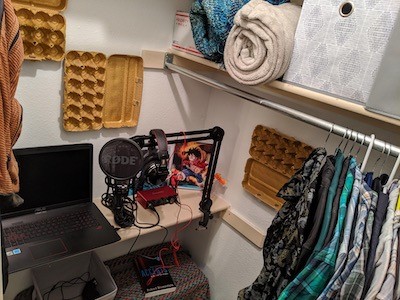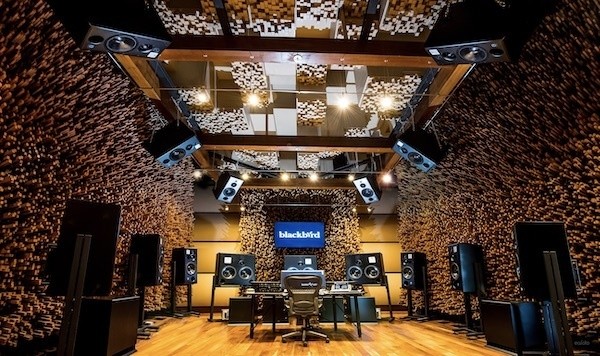Remote voice over recording and home studios
In this article
· Remote voice over recording: still misunderstood in France, standard practice everywhere else
· Private studio vs. commercial studio: it’s not the label that defines a studio’s quality
· "Closet home studios": they are too many – another reason to work with professionals
· Working remotely doesn’t take work away from anyone
· Actor's talent matters more than actor's postcode
Sometimes, as a French voice actor, or any language for that matter, we work remotely (from a commercial studio or our private studio, also known as a 'home studio') with a receiving studio, where our client (producer, artistic director, creative team, direct client, etc.) is in charge of the session. But what is this mysterious technology? Are we talking teleportation here?
Private studios and remote voice over recording: the Star Trek universe?
In France, remote recording and private studios are still sometimes regarded as belonging to the world of science fiction (and should remain there), but in the rest of the world they are a commonplace reality. In the UK, the USA, Scandinavia - in short, just about everywhere else in the world - remote recording has been as normal as face-to-face recording since the avent of internet as we know it today. In fact, many voice actors have their own voice over recording studio and nobody considers them as pariahs. Amazing, isn't it?
Of course, this solution has its limits: in video games, for example, voice director / voice actor collaboration is preferable in person, for various reasons (interaction, character development, confidentiality, etc.). But for advertising or corporate work, working remotely is a viable solution, provided the quality criteria are met, of course.
Setting the record straight
Before we talk about the different solutions for remote recording, let's have a look at private studios - what some people still call 'home studios'. It's an expression I hate: it conjures up in the minds of producers and clients the image of a two-bit microphone in a cupboard. But a real private studio is a real studio, full stop. Are post-production studios called 'office studios'? One is as ridiculous as the other. There are simply good studios and bad studios.
Let's be clear. Apart from France, recording remotely from a private studio is as common as recording in a commercial studio. The priority is to work with the French voice actor (or any voice actor!) who will best serve the script. In France, castings are still sometimes based on postcode rather than talent. For jobs where you know in advance that there will be multiple retakes, finding local actors if possible is a logical choice, but if not? I'm not sure that end customers would approve, if they knew about it...
The notion of a private studio is still sometimes a taboo subject in France. Why is that? First of all, let's put our own house in order: some people are allergic to the notion of investment, and many 'home studios' are in fact a cheap microphone in a cupboard. Other voice talent think they know best, and rather than employing acousticians, or at least studying applied acoustics to design their studio (or get a prefab booth) they choose materials haphazardly, a few slabs of 'acoustic' foam and call the result a 'professional studio'.
When a client receives a mediocre recording, with reverb, pops, audible floor noise, siren or toilet-flushing noises (I'm not making this up!), they'll think twice about employing another voice actor working from their private studio: once bitten, twice shy, as my grandmother used to say. We'll come back to this subject a little later.
But there are other reasons too. For a start: some voice talent who live near post-production studios and are regularly booked by them are afraid of being blacklisted if these studios find out that they have a private studio. I would like to reassure these people: their fears are largely unfounded. The owners of most of these studios are intelligent people who know that private studios do not compete with them. What's more, when working remotely, a receiving studio is always used, which is paid exactly as if the voice actor were in their booth. In other words: no one steals work from anyone. I hope that clears any confusion.
Another, more insidious reason: fear of competition. The reasoning behind this is that restricting access to the profession to those who live close to commercial studios will limit competition. Presumably, people who are booked by these studios are booked because they are talented (and not because of their post codes) and have nothing to fear. When you have a place in the business, talent, skills and professionalism are enough.
A few grumpy people complain that the internet has made it possible for everyone (and not just intermittents living in Paris) to work, while 'forgetting' that the internet has also considerably expanded the potential for work: they want to have their cake and eat it too. That's a lot. I develop this topic, ever so slightly uncomfortable for some, in my article Voice Over: Was It Really Better Before?
Egg cartons are good, aren't they?
Finally, a few well-meaning souls are posing as 'defenders of the quality of the production chain' to castigate 'home studios'. The intention is laudable, and shared by all private studio owners. Let me put it as clearly as I can: voice actors WHO HAVE INVESTED IN THEIR STUDIO defend production quality just as much as post-production studios WHO HAVE INVESTED IN THEIR STUDIO.
Left, a perfect illustration of a "wardrobe studio". Apart from the fact that a 'standard' room, which is not built to the extremely exacting standards of a recording studio, will never offer decent sound insulation, acoustic treatment is also absent. Even if the egg cartons look a bit like foam sheets offering entry-level absorption and diffraction treatment, they serve absolutely no purpose. It's an urban myth. And a fire hazard. To be banned.
Adequate acoustic treatment can include different types of absorption such as bass traps, superchunks, etc., diffusers, diffractors, a ceiling that is not parallel to the floor and walls that are not parallel to each other, reflective surfaces to keep the sound alive, dimensions designed from the outset to be as close as possible to the ideal ratios, etc. This produces a matt sound, without reverb - but not dead, that is both contained and lively. This is the solution adopted by custom-built private studios (like mine, which you can see under construction here) and legitimate post-production studios. There are also more affordable solutions for voice recording: prefab booths which, while not ideal, do a decent job of both sound insulation and acoustic treatment. They do, however, represent a substantial investment: almost 9,000 euros for a decent model.
Finally, without a private studio, we are depriving ourselves of work that comes from abroad, work that has never gone through, does not go through and will never go through post-production studios: this type of work, such as e-learning for example, came into being with the advent of the internet, when voice talent started to equip themselves with their own private studio.
 The magic word? Abracadabrinvest
The magic word? Abracadabrinvest
What's the only difference between a private studio and a post-production studio? No, it's not a joke, here's the answer: the commercial studio is equipped for recording and post-production, whereas the private studio is equipped for recording only. A commercial studio is a place designed to receive clients and is insured as a place open to the public. A private studio is not. That's all there is to it. End of.
This means that voice actors have to offer the same sound quality as a post-production studio which, as mentioned above, requires heavy investment: adequate soundproofing and acoustic treatment are essential, as is professional-grade equipment. When you sell your voice over services from your private studio, you are selling your voice over services AND your private studio services. Of course, your recording studio doesn't have to be as sublime as a studio like the one in the photo above, but when you work in a beautiful place, you're more likely to produce beautiful work.
So, what are the solutions for remote recording? It's all on page 2!



 The magic word? Abracadabrinvest
The magic word? Abracadabrinvest




Write a comment